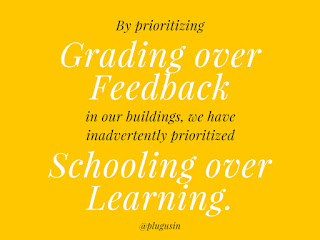Student Feedback Dilemmas
This post is part of the #EdublogsClub – a group of educators and edtech enthusiasts that blog around a common theme each week.
After a few weeks off, I wanted to jump back in but this week's topic--student feedback--has me struggling. Feedback is so very important to all of us. We all crave feedback because we want to know what resonated with people and where to improve. Our students crave feedback because they need affirmation that they "did it right", whatever that means. And here is my struggle. I want our students to crave the learning process. I want them to accept the challenge to always improve. A "good job", or "wow! that's really interesting" is only part of the process. They should then continue from that point and be asking questions like:
"What else can I do with this?"
"Where can I go from here?"
"What will my next step be?"
Instead, they are usually satisfied with the former and move on to their next assignment. How much of that is driven by the way we have created a very compartmentalized education system? Many elementary schools have the opportunity to design truly integrated cross-curricular units. Students can really dive deep into a topic grapple with driving questions, and create something. By they time they hit us in high school, however, those opportunities are far and few between. Now teachers and students alike are compartmentalizing much of the learning in an effort to simply survive. That is a crime. Education should allow students and teachers to THRIVE, not survive.
Students want feedback...sort of. What do they REALLY do with feedback? Honestly,
usually nothing. The teacher spends a good amount of time providing helpful suggestions for "next time" that rarely get read and are even less likely to be applied the "next time" that sort of assignment rolls around. Teachers (at least I know I did when I was in the classroom and many of my colleagues do the same today) spend hours grading because they want to provide as much feedback as necessary. After all, feedback is one way that we can connect with the students individually and help move them forward. We can't, however, realistically keep up with the demand of providing copious notes to each student on EVERY assignment because that is humanly impossible. Even with the addition of peer review, Google Docs collaboration and voice comments, it is still overwhelming. So then we become selective about the assignments that we actually provide detailed feedback on, or we begin to focus on just one aspect of the assignment for feedback each time, and we incorporate student reflections as part of the assignment, all in an effort to still have the students complete an appropriate amount of work, move the required curriculum forward, and not skimp on feedback. For larger assignments, when you try to incorporate a revision opportunity, some students feel resentful. Not because you want them to have a shot at improving their grade, but because this then becomes an assignment on top of the all the other "regular" assignments that are cued up for that week. It almost seems unfair. And of course then they might question their ability to do well on the revision while also keeping up with the regular assignments that are expected in your class and their many others. It feels a bit like being stuck on a hamster wheel!
But honestly, regardless of the method, I still feel that we are doing students a huge disservice. Not because we are experimenting and finding ways to mix up the feedback. Not because the students don't seem to really look at our comments. But because we have yet to find a successful, scalable approach to inspiring our students to WANT to linger on an assignment and improve their work. They do this all the time through their extra-curricular activities (sports, music, drama, robotics, etc.). They will spend HOURS pursuing their passions outside of school. Whey can't we find a way to support their passion DURING school? This, I think, is a much deeper issue than I could fairly comment on here because it is the bigger question of education in our country. Colleges and universities profess to have certain expectations and thus high schools need to work to meet those expectations. So middle schools need to "prepare" students for the high school expectations and that then pushes down to elementary schools and so on. I think I am overly sensitive to this whole cycle because our high school is college prep, not comprehensive. Thus, the course offerings are more limited and passion is often only found outside the classroom for many students.
A true overhaul of education expectations, starting with higher education might provide some solutions to this dilemma. But that isn't realistic. So until such time as a clear solution is presented, I think it is imperative that we as educators continue to collaborate with each other, be willing to take risks, and try new approaches in our classrooms to find a process that works for us and our students to deliver meaningful feedback. I know I don't have the answer but I am always willing to learn from others who have something that is working to figure out how to apply it at our school.
"What else can I do with this?"
"Where can I go from here?"
"What will my next step be?"
Instead, they are usually satisfied with the former and move on to their next assignment. How much of that is driven by the way we have created a very compartmentalized education system? Many elementary schools have the opportunity to design truly integrated cross-curricular units. Students can really dive deep into a topic grapple with driving questions, and create something. By they time they hit us in high school, however, those opportunities are far and few between. Now teachers and students alike are compartmentalizing much of the learning in an effort to simply survive. That is a crime. Education should allow students and teachers to THRIVE, not survive.
Students want feedback...sort of. What do they REALLY do with feedback? Honestly,
 |
| Image Credit |
But honestly, regardless of the method, I still feel that we are doing students a huge disservice. Not because we are experimenting and finding ways to mix up the feedback. Not because the students don't seem to really look at our comments. But because we have yet to find a successful, scalable approach to inspiring our students to WANT to linger on an assignment and improve their work. They do this all the time through their extra-curricular activities (sports, music, drama, robotics, etc.). They will spend HOURS pursuing their passions outside of school. Whey can't we find a way to support their passion DURING school? This, I think, is a much deeper issue than I could fairly comment on here because it is the bigger question of education in our country. Colleges and universities profess to have certain expectations and thus high schools need to work to meet those expectations. So middle schools need to "prepare" students for the high school expectations and that then pushes down to elementary schools and so on. I think I am overly sensitive to this whole cycle because our high school is college prep, not comprehensive. Thus, the course offerings are more limited and passion is often only found outside the classroom for many students.
 |
| Image Credit |
A true overhaul of education expectations, starting with higher education might provide some solutions to this dilemma. But that isn't realistic. So until such time as a clear solution is presented, I think it is imperative that we as educators continue to collaborate with each other, be willing to take risks, and try new approaches in our classrooms to find a process that works for us and our students to deliver meaningful feedback. I know I don't have the answer but I am always willing to learn from others who have something that is working to figure out how to apply it at our school.



I like the quote.
ReplyDeleteClearly I can't take credit for it, but agreed. It is a great quote!
DeleteMy first feedback to you was going to be shorten the blog as I often only have a few minutes to read and comment. However, yours was worth reading to the end! I think the more ownership and choice our kids have and the likelihood that they are producing something real that will be shared beyond the walls of the school, the more likely they are to put that effort in to dig in and revise until it is great.
ReplyDelete